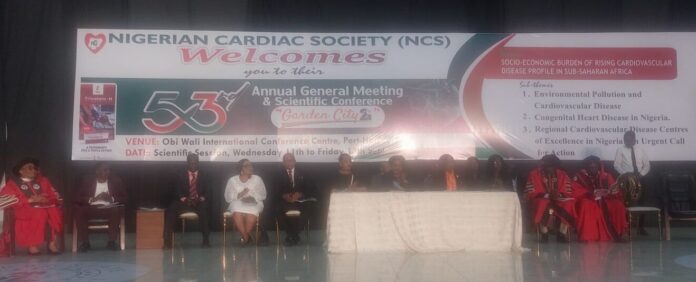By Desmond Ejibas
Mrs Emmanuella Arukwe, Managing Director of NNPC Foundation, has expressed concern over rising prevalence of heart disease fatalities in the country.
Arukwe spoke at the 53rd annual general meeting and scientific conference organised by the Nigerian Cardiac Society (NCS) on Wednesday in Port Harcourt.
The theme of the conference was “Socio-Economic Burden of Rising Cardiovascular Disease Profile in Sub-Saharan Africa.”
Represented by Mrs Dominion Eugenia, the Foundation’s Executive Director of Finance, Arukwe said that the foundation was supporting healthcare initiatives to lower mortality rates.
She said that data from global heath institutions revealed more than 18 million annual deaths from cardiac failure, making the disease the leading cause of global deaths at 32 per cent.
“In Africa, cardiovascular diseases cause about 11 per cent deaths, with rising prevalence attributed to lifestyle changes and urbanisation.
“In Nigeria, an estimated 12 per cent of the adult population suffers from various cardiovascular conditions.’’
The managing director stressed the pressing need for enhanced healthcare interventions and public awareness, noting the foundation’s decision to collaborate with NCS and health facilities nationwide to tackle the disease.
“NNPC Foundation is dedicated to fostering health and wellbeing, advancing education, supporting environmental sustainability and empowering communities.
“Our healthcare initiatives aim to enhance access to quality medical services, support innovative research, and improve overall health outcomes for communities across Nigeria.
“We are committed to easing the financial burden on individuals facing economic challenges and ensuring access to essential treatments for eneryone,” she said.
On his part, NCS President, Prof. Augustine Odili, said that cardiologists at the conference would brainstorm solutions to reduce the increasing cardiovascular mortality rate in the country.
He added that they would come up with cost-effective methods to enhance the cardiovascular health of Nigerians.
“Nigeria’s economic situation necessitates low-cost measures that can make maximum impact for the people.
“This conference gathered stakeholders from various sectors, including policymakers, academia, civil society organisations and individuals living with heart conditions to advocate for healthier hearts,” he remarked.
Retired Justice Mary Peter-Odili, who chaired the meeting, warned that heart disease was nearing epidemic levels in the country and called for collective action.
Peter-Odili, the Pro-Chancellor, Rivers State University, noted the alarming trend of children being born with treatable heart conditions due to inadequate healthcare infrastructure.
She advocated for the establishment of Regional Cardiovascular Disease Centres of Excellence to provide advanced care.
“These centres can be hubs for research, training, and the provision of high-quality care, setting new standards for cardiovascular health,” she advised.
Rivers Deputy Governor, Prof. Ngozi Odu, reiterated the state government’s commitment to improving access to healthcare.
She said that funds had been allocated to strengthen medical institutions to address cardiovascular disease and other health conditions in the state.
“However, there is need for people to adopt healthier lifestyles and reduce their intake of processed foods, drinks and GMOs,” she advised.
In a keynote address, Prof. Amam Mbakwem, Vice President of World Heart Federation, said that high blood pressure, kidney issues and elevated fasting glucose levels were among the conditions contributing to heart disease. (NAN)





